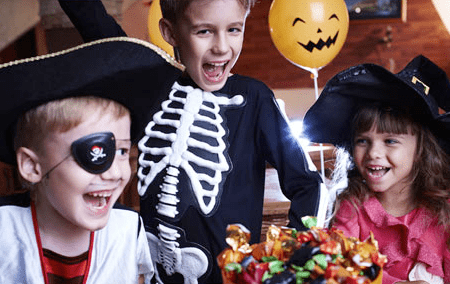By Wendy Rice, Psy.D. Licensed Psychologist
 Halloween. Ahhhh. A smile just takes over my face as I say the word.
Halloween. Ahhhh. A smile just takes over my face as I say the word.
I remember walking around Great Neck, New York with my friend Amy and sometimes other kids as well, filling up my plastic pumpkin and then coming home to sort through my loot. Halloween is the time of year when I discovered that Clark Bars, Bit-O-Honey and what used to be called $100,000 Bars (now called 100 Grand Bar) were oh so delicious.
And the costumes? Childhood memories of the elephant costume made out of a hooded gray sweat suit (stuffed trunk and all), the devil costume I wore for more than one year, and what about those plastic ones that are like hospital gowns with the old fashioned masks?
 We were allowed to walk around without an adult back in the 70’s and 80’s. We had no cell phones and I don’t even remember wearing a watch. How times have changed.
We were allowed to walk around without an adult back in the 70’s and 80’s. We had no cell phones and I don’t even remember wearing a watch. How times have changed.
Now parents worry over how to keep the spirit of Halloween while managing:
- Candy: the vast amounts and media hype around taking candy from strangers
- Costumes: crazy expensive or way too revealing
- Caution: to trick-or-treat with or without adult supervision? Free access to all candy and for how long? How young is too young for scary amusement park events?
Here are some tips that can help you focus more on the pretend scares of this holiday and less on the real ones:
Candy
Let’s face it, kids (and many adults) love candy! Please take the following as general guidelines from a psychologist and candy lover. They do not apply to those with medical conditions and you know your own children best so please consider accordingly.
For one night a year, on October 31st, I believe it’s a great night to let your kids do their own policing of what and how much they choose to eat as long as they know to look out for wrappers that look open or tampered with.
You may even find that when you don’t put limits on your kids, they begin to impose their own. They may surprise you and stop when their stomachs start to ache or when they’ve simply had enough. Some kids love to sort their candy or lay it all out just to sit with the pleasure of seeing so much of it in one place. Some just want to put their hands in it so they can feel and smell paradise!
Next question is what to do the next morning when you still have all that candy. And, that will depend on your parenting style.
- You may choose to leave it in the pantry and allow the kids free access.
- Or, you may let the kids choose a few pieces (or just one) to eat each day.
- Perhaps you will just toss the lot of it. (I think getting rid of it all right away can lead to resentment on the part of your kids who did the “hard work” of collecting it but others say out of sight, out of mind)
- You might decide that 2 weeks is a reasonable amount of time to keep the candy in the house.
Whatever your choice, I encourage you to talk it over with your kids to reach an agreement that makes some sense to them as well.
Costumes
I have actually been featured on television and the radio talking about children and teens in costumes that are too sexualized (click here to listen to one of these interviews).
I believe that parents need to give the okay or not okay to their kids costumes in the same way they would do on any other day.
If a child or teen chooses a costume that is too revealing because it is too short, too low cut or simply shows too much of their body, let them know that they need to either alter it or choose something different. Explain that calling too much attention to their body in a sexual way is kind of like an invitation to others that those body parts are public and open for both viewing and touching. Costumes can be cute without being too revealing.
From a safety standpoint, costumes need to allow kids to see, be weather appropriate and kids need to be able to move in them. So, beware of them being too long or wearing shoes that are not suitable for roaming the neighborhood.
Caution
As far as trick-or-treating goes, the age at which kids are allowed to walk around without an adult depends on your neighborhood, your child, and your child’s friends.
In some places, kids can walk around on their own by mid elementary school. In other places, I wouldn’t really want a middle-schooler walking around without an armed guard!
Take into account the following: Does your child have a cell phone? Can you make some mid-way points to meet up? Can you wait at the end of the street and let them go house to house on their own for a bit?
For many kids, trick-or-treating without an adult is a rite of passage that they wait and wait for. Give them as much independence as you feel comfortable giving.
As far as going to the big and often scary Halloween events (like Howl-O-Scream at Busch Gardens, Tampa or Halloween Horror Nights at Universal, Orlando), please do your research. Go to the website and read the reviews. Find out as much as you can about the types of experiences and whether they are recommended for your child’s age group.
Here are some helpful questions to consider as you make your decisions:
- Can the entertainers “touch” the people going through them or is it just smoke and mirrors?
- Is your child prone to nightmares and easily frightened?
- Does your child enjoy scary and suspenseful movies?
- Does your child generally enjoy amusement parks and rides?
- Can they handle being at a park at night?
For many kids, having an adult at the beginning and end of the haunted house will be adequate. Others might want the adult to go through with them. And yet others, would prefer not to go at all if an adult insists on accompanying. You have to do what you feel comfortable with based on your child.
I hope this little guide is helpful for you as All Hallows Eve approaches.

